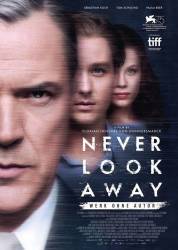Character mistake: The tour guide inside the "Degenerate art" exhibition ridicules the 'child-like' paintings of the likes of Mondrian and Kandinsky. In particular he stands in front of Kandinsky "Upward." The German name of the work is "Empor", but the tag says "Empore." (00:03:40)

Never Look Away (2018)
Plot summary
Directed by: Florian Henckel von Donnersmarck
Starring: Sebastian Koch, Paula Beer, Saskia Rosendahl, Tom Schilling
The film begins in the late 1930s in Germany. Young Kurt Barnert, fascinated by art, visits an art exhibition where he encounters a painting of his aunt Elisabeth. Kurt's aunt suffers from mental illness and is ridiculed by the family. One night, fearing she will be taken away by the Nazis, she encourages Kurt to hide with her under the bed. They witness her being taken away and eventually end up in a psychiatric hospital.
Years later, it is post-war Germany, and a grown-up Kurt attends an art school under the supervision of Professor Antonius van Verten. Here he meets a fellow student named Ellie Seeband, and they develop a romantic relationship. Van Verten encourages Kurt to embrace his own artistic expression and to never look away.
Kurt's artistic journey takes a significant turn when Van Verten realises that Ellie is the daughter of Dr. Carl Seeband, a former Nazi doctor responsible for forced sterilization during the war. Van Verten, aware of Seeband's past, challenges Kurt to create art that reflects the horrors of war without looking away.
Kurt and Ellie decide to get married and move to East Germany. Kurt continues his artistic pursuits while working as a billboard painter, but he faces difficulty creating art that truly represents his experiences. He eventually meets a famous artist named Ferdinand Lohse who influences his style and helps him refine his artistic vision.
During this time, Kurt is haunted by memories of his past and the truth behind his aunt's disappearance. He starts to paint a series of portraits depicting the traumatic events from his childhood, including the one of his aunt. As he delves deeper into his art, he starts to unravel the connection between his own family and the atrocities committed during the Nazi era.
Kurt's artwork eventually gains recognition, and he is invited to participate in an art exhibition in West Germany. There, he encounters a painting that eerily resembles his aunt Elizabeth, confirming his suspicion that she was one of the victims of the Nazi program to exterminate mental patients.
In the final act of the film, Kurt confronts Ellie's father, Carl Seeband, at the exhibition. Seeband confesses his terrible actions during the war and reveals that he deliberately let Elisabeth die. This revelation enrages Kurt, and he attacks Seeband, leading to his arrest.
In the aftermath, Kurt becomes a successful artist, gaining critical acclaim for his work. He continues to paint, focusing on the painful truth of his past and the collective memory of the nation. The film ends with Kurt embracing his past, never looking away, and creating art that captures the essence of his experiences.
Kurt Barnert: You smoke?
Professor Carl Seeband: Sixty-three is the right age to start. The consequences will hardly catch up with me.
Join the mailing list
Separate from membership, this is to get updates about mistakes in recent releases. Addresses are not passed on to any third party, and are used solely for direct communication from this site. You can unsubscribe at any time.
Check out the mistake & trivia books, on Kindle and in paperback.



